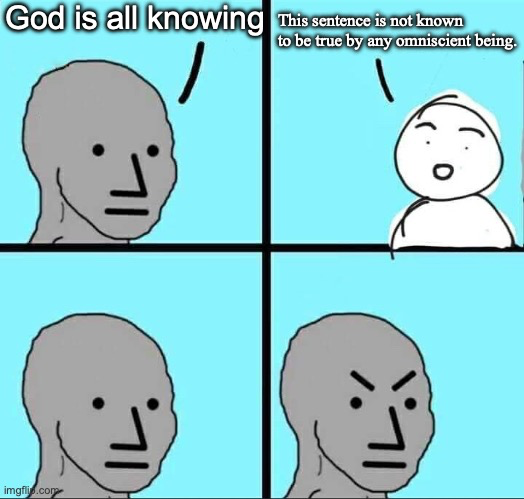this post was submitted on 30 Oct 2024
67 points (80.2% liked)
Atheist Memes
5533 readers
483 users here now
About
A community for the most based memes from atheists, agnostics, antitheists, and skeptics.
Rules
-
No Pro-Religious or Anti-Atheist Content.
-
No Unrelated Content. All posts must be memes related to the topic of atheism and/or religion.
-
No bigotry.
-
Attack ideas not people.
-
Spammers and trolls will be instantly banned no exceptions.
-
No False Reporting
-
NSFW posts must be marked as such.
Resources
International Suicide Hotlines
Non Religious Organizations
Freedom From Religion Foundation
Ex-theist Communities
Other Similar Communities
!religiouscringe@midwest.social
founded 1 year ago
MODERATORS
you are viewing a single comment's thread
view the rest of the comments
view the rest of the comments

Redefining 'good' to whatever it is you speculate may be cooking in Zeus's noggin isn't going to dodge the Epicurian paradox, it just changes it to god can't be all three of 1) all-powerful, 2) all-knowing, 3) all-whatever-the-fuck-word-god-chooses-to-use-to-label-the-concept-of-the-thing-we-call-'good'.
That's like arguing that the thing you're looking at right now isn't a screen, because maybe god calls it a chipmunk instead.
This isn't about labels, but the substance of the thing itself
god can be "all good" if the definition is different to the one you or Epicurus is using.
To restate what I said above, all Epicurus is really saying is "god can't be all powerful, all knowing and fully good according to Epicurus' definition of good."
For the Epicurean paradox to work one has to assume that his definition of good is both correct and universal. That's all I'm pointing out.
I'm not trying to needlessly spilt hairs; abrahamic religions are quite up front that god's idea of goodness is different to 'human goodness'.
So whether or not the statement makes sense depends entirely on whose concept of goodness you assume at the outset.